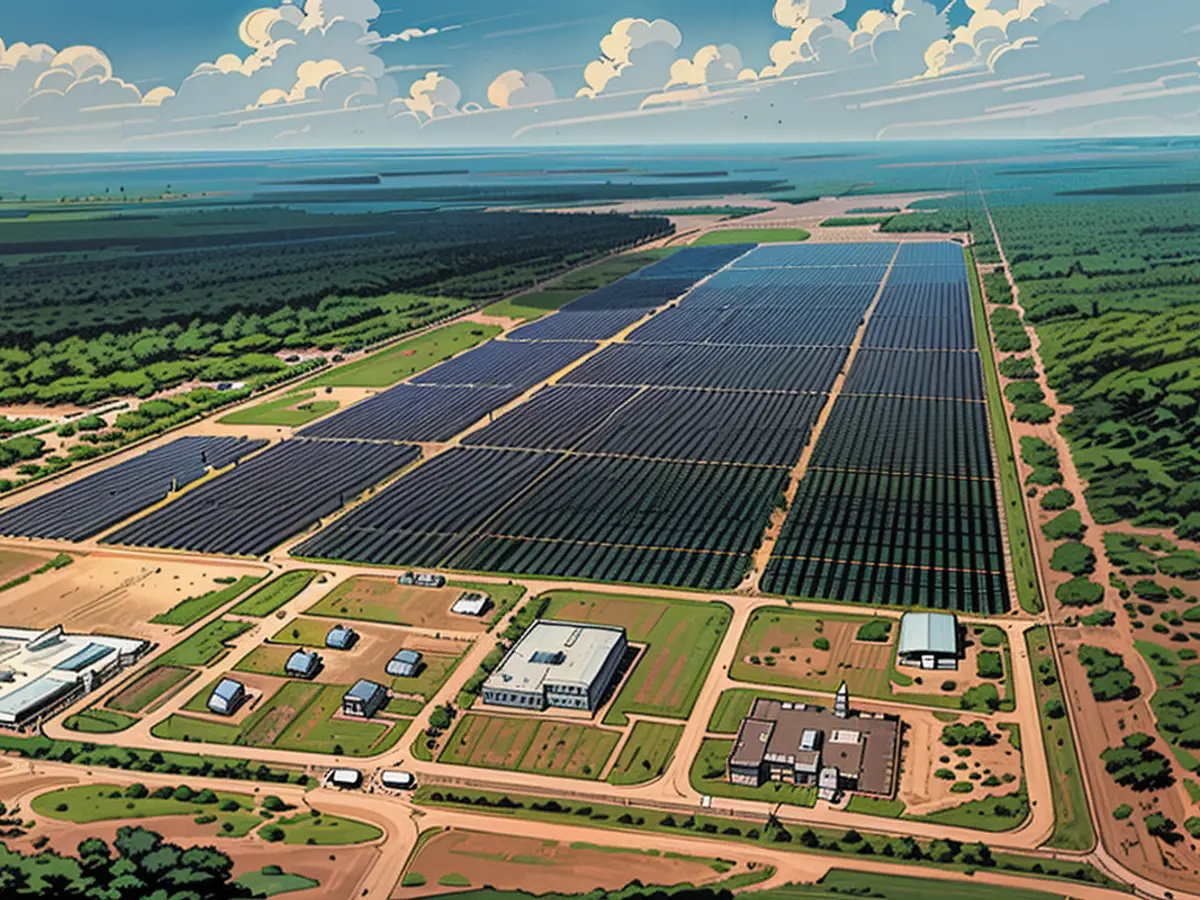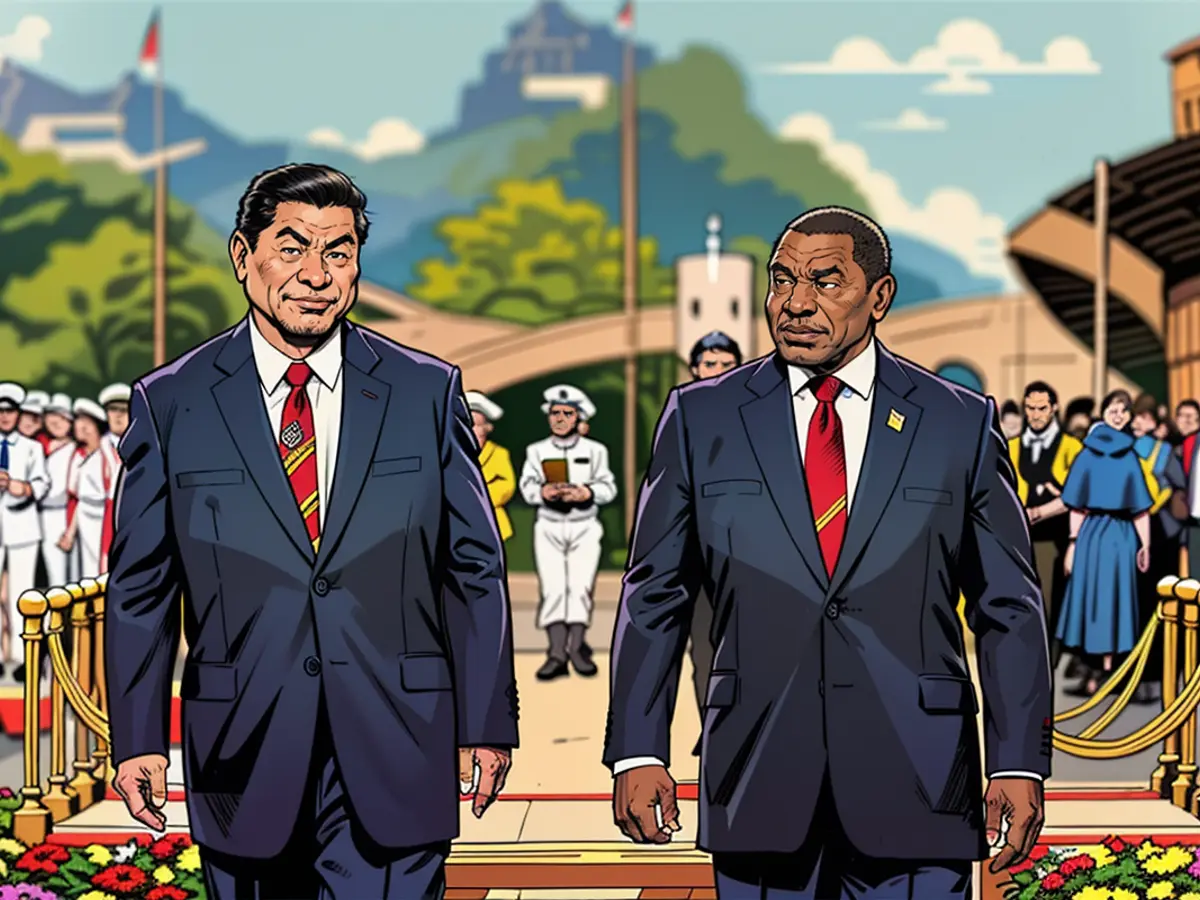- China aims to bring joy to Africa by augmenting solar energy expansion
Disruptions, land confiscations, forced relocation. Just prior to this year's gathering of African heads of state with the Chinese administration, environmental activists are bringing attention to one of the downsides of Chinese investments in Africa, particularly in relation to Uganda. In a coastal area of Lake Albert, residents are facing hardships due to the proposed construction of an oil refinery linked to an oil extraction and pipeline project led by the Chinese firm CNOOC. Climate Rights International is leveling serious allegations against the military forces of the African nation, claiming that the project is "not just a carbon time bomb, but also a disaster for human rights," as stated by executive director Brad Adams.
This isn't the first time such accusations have been made, and it likely won't be the last. It's been pointed out in a study by the Global Development Policy Center (GDPC) at Boston University that China's involvement in Africa frequently receives poor Environmental, Social, and Governance (ESG) ratings due to disregard for environmental and labor protection regulations, or social and governance concerns regarding affected communities. The study analyzed some energy infrastructure and special economic zones projects in Egypt, Ethiopia, and Nigeria, which are popular investment destinations, and discovered that while they created jobs and boosted economic growth, there was "significant room for improvement" in compliance. China's presence on the continent also aggravated the greenhouse gas emissions situation due to lax or ignored environmental regulations, with funding primarily going toward coal power, labor and resource-intensive processing industries, resource extraction, and construction.
Now, the Chinese leadership, which has been focusing on climate neutrality within its borders for some time, is also adjusting its approach to Africa and emphasizing green technologies in economic relationships. Actually, investments in infrastructure or greenfield projects under the Belt and Road Initiative have been decreasing in recent years. During the summit in Beijing starting on Thursday, China aims to bolster business with renewable energy and electric mobility with Africa. Given that Chinese auto manufacturers and factories producing solar and wind technology have amassed substantial overcapacity that they can no longer easily sell in EU and US markets, this presents an opportunity.
Two decades of economic engagement between China and Africa have escalated to such an extent that China is now the largest bilateral trading partner and the primary export destination for most African countries. Since 2013, Beijing has been the biggest bilateral foreign direct investor and the largest single bilateral creditor in Africa. "China's deepened economic connections and investment flows to Africa," according to the Boston-based GDPC, "are a subject of debate about their design, their intentions, and the balancing of benefits and risks – with potential long-term implications for the continent's industrial development, modernization, and sustainable economic transformation."
The White Paper "China and Africa in the New Era: A Partnership of Equals" by the Chinese State Council in 2021 reported that since the creation of the Forum on China-Africa Cooperation (FOCAC) in 2000, Chinese companies have supported African countries in the construction or modernization of more than 10,000 kilometers of railways, nearly 100,000 kilometers of highways, around 1,000 bridges, nearly 100 ports, and 66,000 km of power transmission and distribution lines. According to data from the General Administration of Customs of China, the trade between China and Africa reached a record high of 282 billion dollars in 2023.
Green Technology "Made in China"
When Chinese President and Communist Party Leader Xi Jinping opens the ninth China-Africa Summit, he encourages his guests from countries like Gambia, Kenya, Nigeria, Zimbabwe, and South Africa to opt for low-emission industrial development by favoring Chinese manufacturers of wind and solar technology or electric vehicles. At the same time, Beijing is working to improve its access to raw materials essential for electric mobility and future storage systems, which are abundant in Africa's soil, such as lithium, cobalt, and copper in Botswana, Namibia, and Zimbabwe.
Before the summit, government officials and experts from both sides came to an agreement in Shanghai on "intensified strategic cooperation" for optimizing energy structures and in areas of low-emission technologies, climate-friendly financing, and green talent cultivation, as reported by "China Daily". The shift from fossil fuels to renewable energy sources, they claimed, is crucial for climate protection and requires increased investment in technology and infrastructure.
According to analyses by Boston University, China's lending to African projects has increasingly shifted towards green and high-tech pursuits rather than financing more bridges or roads. Funding was allocated for solar farms, electric vehicle factories, or 5G stations for improved internet connectivity. Out of 4.2 billion dollars from 13 loans in 2023 to eight African governments and two regional banks, 500 million dollars were assigned for hydropower and solar projects.
Renewable Energy Capacity to be Increased Sixfold
Africa has recently raised its objectives for its energy transition. Before the 2023 World Climate Conference, the African Union (AU) committed at the first Africa Climate Summit to increasing the capacity of renewable energy from the current around 50 gigawatts to 300 gigawatts by 2030. As a result, China's export targets for renewable energy could find fertile ground among the African state delegates. However, they are now also more cautious about additional debt.
China has been actively advocating for climate protection in its international relations for several years. In 2015, it established a "South-South Climate Cooperation Fund" to assist developing countries in adapting to climate change. In 2021, it promised the AU to invest more in clean energy and less in coal-fired power plants. In Kenya, it financed the construction of a 50-megawatt solar park, which has been generating electricity for more than 350,000 people in 70,000 households since its launch in 2019.
The World Resources Institute also highlights that Beijing intends to shift its focus towards smaller, more appealing initiatives when expanding clean energy offerings in the future. One of the initial collaborative programs, dubbed the "Africa Solar Belt," is planned to provide around 50,000 African households with solar power through decentralized systems by 2027. These projects, such as "mini-grids" comprised of small, self-governing networks usually powered by solar energy and local energy storage, are often cost-inefficient, hindering the acquisition of private investors and operators. China's "Solar Belt" project is still in its infancy stages, with experts suggesting the need for additional support, particularly addressing gaps in feasibility studies for developers.
Solar energy has been identified as an inexpensive energy source in various African regions, particularly for households not relying on central grids. According to the International Energy Agency (IEA), in 2022, the budget allocated for Chinese investments in African coal power stations has the potential to finance more than half of the essential new solar power capacity required. In line with the IEA's sustainability roadmap for Africa, it's expected that 80% of future energy generation will originate from renewable sources like solar, wind, hydroelectric power, and geothermal by 2030.
However, environmental projects are prompted to give greater consideration to human and land rights. Incidents of discontent among the neighboring communities surrounding Garissa, a significant solar power plant in northern Kenya, have not been reported, much like the Ugandan oil project. Nevertheless, local residents lament that they missed an opportunity to utilize solar power for irrigation as small-scale farmers were not integrated into the project. Despite agreeing to the project and receiving compensation for relinquished land, the community now regrets surrendering 200 hectares of pastureland without necessity.
The European Union could express concern over the human rights violations associated with the construction of the oil refinery in Lake Albert, given its commitment to promoting sustainable development and respecting human rights in its external relations. The European Union might also urge the Chinese administration to consider investing in more green technology projects in Africa, in line with its own focus on climate neutrality and decarbonization.









